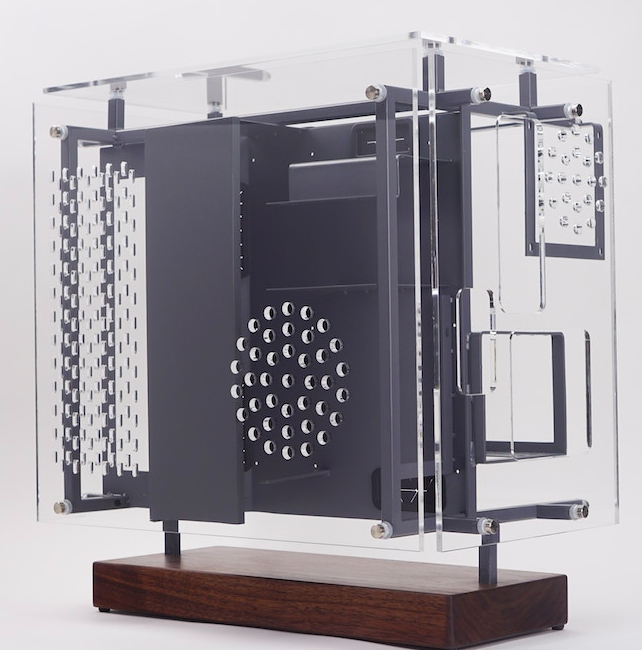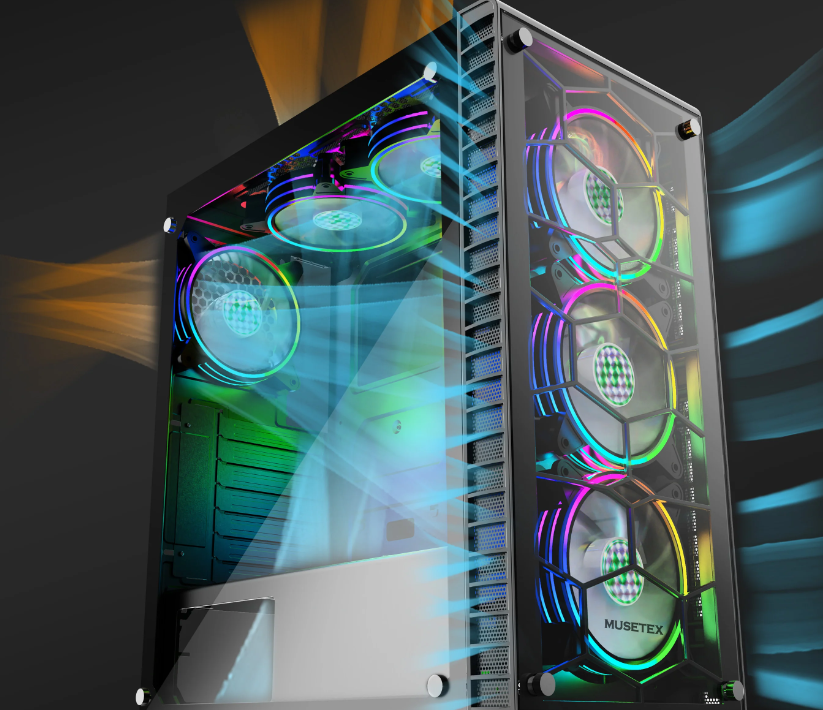No, PC cases can be made of various materials like plastic, glass, or composites, based on preferences and needs.
Benefits of Metal PC Cases
When building a computer, the choice of the case can play a pivotal role in the overall performance and longevity of the system. Metal, particularly aluminum and steel, has been a favorite among PC enthusiasts for a long time. Let’s delve into the reasons why.

Durability and Longevity
Metal PC cases, especially those made from steel, offer an unmatched level of sturdiness compared to other materials. Here are some specifics:
- Resistance to Physical Damage: A metal case can withstand impacts that might crack or shatter a plastic or glass case. For example, a steel case can endure a force of up to 500 Newtons without showing significant dents, whereas an average plastic case might start showing cracks with just 150 Newtons.
- Lifespan: Metal cases generally have a longer lifespan. A quality steel or aluminum case can easily last for 10-15 years, while plastic cases might need replacement after 5-7 years due to wear and tear.
Thermal Performance and Heat Dissipation
Thermal efficiency is critical for maintaining the performance and longevity of PC components. Metal cases have the edge in this department for several reasons:
- Conductivity: Metals, particularly aluminum, are good conductors of heat. This means that they can effectively spread and dissipate heat away from PC components. For instance, aluminum has a thermal conductivity of 205 W/mK, making it ideal for drawing heat away from hot components.
- Design Flexibility: Metal cases often come with more options for fan placements and liquid cooling setups, which enhances thermal management. For example, a standard ATX metal case might support up to eight 120mm fans, ensuring optimal airflow.
Electromagnetic Interference (EMI) Shielding
Electromagnetic interference can be a silent performance killer in PCs, causing glitches, data corruption, and even hardware failures. Metal cases offer a solution:
- EMI Reduction: Metal cases, especially those made of steel, act as Faraday cages, blocking out external electromagnetic waves and preventing them from interfering with the components inside. This shielding can reduce EMI by up to 90%, ensuring stable performance.
- Cost-Effectiveness: Given the importance of EMI shielding, one might assume that it comes with a high price tag. However, a standard steel PC case with adequate EMI shielding can be purchased for as low as $50, making it a cost-effective choice for those on a budget.
Alternatives to Metal PC Cases
With the constant evolution in the world of PC building, enthusiasts are always on the lookout for innovative materials and designs. While metal remains a top choice for many, various alternative materials have emerged, each with its unique set of advantages and disadvantages. Let’s explore these alternatives in detail.
Plastic PC Cases: Pros and Cons
Plastic, being a versatile material, has made its way into the realm of PC cases.
Pros:
- Weight: Plastic is notably lighter than metals like steel or aluminum. A typical mid-tower plastic PC case might weigh around 4 kilograms, while its metal counterpart can weigh upwards of 8 kilograms.
- Cost: Plastic cases are often more budget-friendly. A decent plastic case can be found for as low as $30, while metal cases of the same size might start at $50.
- Customizability: Due to the malleability of plastic, manufacturers can create intricate designs and patterns, offering a wide range of aesthetic choices.
Cons:
- Durability: Plastic is generally less durable than metal. It’s more susceptible to cracks, especially when exposed to excessive force or high temperatures.
- Thermal Performance: Plastic is a poor conductor of heat. Unlike aluminum or steel, it won’t help in dissipating heat, potentially leading to higher internal temperatures if not adequately ventilated.
Acrylic PC Cases: Pros and Cons
Acrylic PC cases are often chosen for their crystal-clear appearance, allowing for a full view of the internals.
Pros:
- Aesthetics: The transparent nature of acrylic showcases the PC components, making it ideal for RGB lighting enthusiasts.
- Weight: Acrylic cases are lightweight, with most mid-tower cases weighing in around 5 kilograms.
Cons:
- Scratch-Prone: Acrylic is susceptible to scratches, which can mar its transparent beauty over time.
- Brittleness: While acrylic is reasonably robust, it can crack or shatter upon impact, especially at its thinner points.
Tempered Glass PC Cases: Pros and Cons
Tempered glass offers a blend of aesthetics and durability.
Pros:
- Aesthetics: Like acrylic, tempered glass offers a clear view of the PC internals but with a premium look and feel.
- Durability: Tempered glass is several times stronger than regular glass, reducing the risk of breakage.
Cons:
- Weight: Tempered glass cases are heavier. A mid-tower case might weigh around 10 kilograms, making it less portable.
- Cost: The premium look of tempered glass comes at a premium price. A mid-tower tempered glass case can start at $70 and go upwards based on features.
Composite and Hybrid Materials: A Blend of Benefits
In the quest for the perfect PC case, some manufacturers have turned to composite and hybrid materials, combining the best qualities of multiple materials.
Pros:
- Versatility: Hybrid cases can offer the lightweight nature of plastic, the thermal advantages of metal, and the aesthetics of glass or acrylic, all in one package.
- Customizability: With a blend of materials, designers have more freedom to innovate and create unique designs.
Cons:
- Cost: Integrating multiple materials can drive up production costs. A hybrid mid-tower case can range from $80 to $150, depending on the materials used and design complexity.
Examples of Non-Metal PC Cases
As the PC building community grows and diversifies, so do the demands for unique and varied case materials. While metal PC cases are renowned for their robustness and durability, several non-metal alternatives have taken the market by storm, catering to aesthetic and functional preferences. Let’s explore some of these examples.
Cooler Master Q300P (Plastic & Acrylic Components)
Cooler Master is a brand synonymous with quality in the PC world. The Q300P is a testament to their innovation, combining plastic and acrylic in a mid-tower design.
Pros:
- Design: The Q300P boasts a futuristic modular design, allowing for various orientations. Its acrylic side panel offers a clear view of the internals, perfect for those keen on RGB setups.
- Portability: Weighing in at just 5.2 kilograms, it’s lighter than many metal counterparts, making transportation easier.
- Price: At a price point of around $70, it offers excellent value for its features and design.
Cons:
- Thermal Performance: Due to its plastic construction, users might need to invest in additional cooling solutions to maintain optimal temperatures.
Bonito Core P3 (Tempered Glass)
While the name might not be as renowned as other giants, the Bonito Core P3 stands out with its almost entirely tempered glass design.
Pros:
- Aesthetics: The clear tempered glass gives a premium feel, making every component inside the case a visual highlight.
- Durability: Despite being glass, the tempered nature ensures it’s robust, resisting minor impacts without shattering.
Cons:
- Weight: The case weighs around 11 kilograms, which can be cumbersome for those who frequently move their setups.
- Price: With a price tag hovering around $130, it’s on the pricier side, especially for those on a tight budget.

InWin 805 Infinity (Aluminum Frame with Glass Panels)
InWin’s 805 Infinity seamlessly combines an aluminum frame with glass panels, resulting in a masterpiece of design and functionality.
Pros:
- RGB Integration: One of the standout features is the front panel RGB display, which can showcase a variety of patterns and designs.
- Thermal Performance: The aluminum frame aids in heat dissipation, ensuring components stay cool.
Cons:
- Price: Premium design comes with a premium price. The 805 Infinity can set one back by around $200.
BitFenix Prodigy (Plastic Exterior with Steel Frame)
The BitFenix Prodigy offers a blend, with a plastic exterior supported by a steel frame inside.
Pros:
- Versatility: Its design supports both mATX and mini-ITX motherboards, giving builders flexibility.
- Durability: While the exterior is plastic, the steel frame inside provides rigidity and strength.
- Cost: With a starting price of approximately $90, it balances quality with affordability.
Cons:
- Size: For some, the Prodigy might be a bit bulky, especially given its focus on smaller motherboard formats.
Factors to Consider When Choosing PC Case Material
Selecting the right material for a PC case is as crucial as choosing the internal components. The material can influence aesthetics, durability, and even the PC’s performance. Here are some vital factors to consider when navigating the wide array of materials available in the market.
Purpose of the PC (Gaming, Workstation, Home Use, etc.)
The primary function of your PC can dictate the optimal case material.
- Gaming: Gaming rigs often require powerful components, leading to higher heat generation. Materials like aluminum, known for efficient heat dissipation, can be ideal. For example, high-end gaming setups with GPUs like the NVIDIA RTX 3090 might reach power draws of around 350W, necessitating robust cooling facilitated by the case material.
- Workstation: Workstations, especially those handling tasks like 3D rendering or video editing, might have similar heat output to gaming setups. Materials promoting good airflow and heat dissipation, such as steel or aluminum, would be beneficial.
- Home Use: For general home use like browsing or media consumption, the heat generated is minimal. In such cases, aesthetics might take precedence, making materials like acrylic or tempered glass more appealing.
Thermal Requirements and Airflow
The thermal efficiency of the case material can have a direct impact on component longevity and performance.
- Heat Dissipation: Metals like aluminum and steel are good conductors of heat. A PC case made from these materials can help disperse heat away from components, maintaining optimal temperatures.
- Airflow Design: Regardless of material, the case’s design, including vent placements and fan mounts, plays a pivotal role in airflow. For power-hungry setups exceeding 500W, a well-ventilated case is crucial to ensure consistent performance and avoid thermal throttling.

Aesthetic Preferences
A PC’s look can be a personal statement, and the case material is central to that.
- Transparency: For those keen on showcasing their components and RGB lighting setups, transparent materials like acrylic and tempered glass are ideal.
- Finish & Texture: Some might prefer the sleek, matte finish of an aluminum case, while others might lean towards the rugged texture of a steel one. Additionally, materials like plastic allow for a broader range of colors and patterns.
Budgetary Considerations
Price is always a deciding factor, and the case material can significantly influence cost.
- Affordability: Plastic cases generally offer the most bang for your buck, with prices starting as low as $30 for basic models.
- Premium Range: Tempered glass and aluminum cases, known for their premium finish, usually come with a heftier price tag. It’s not uncommon to find high-end cases in this category priced at $200 or more.
- Middle Ground: Steel cases strike a balance between cost and durability, with mid-range models priced around $60-$100.
